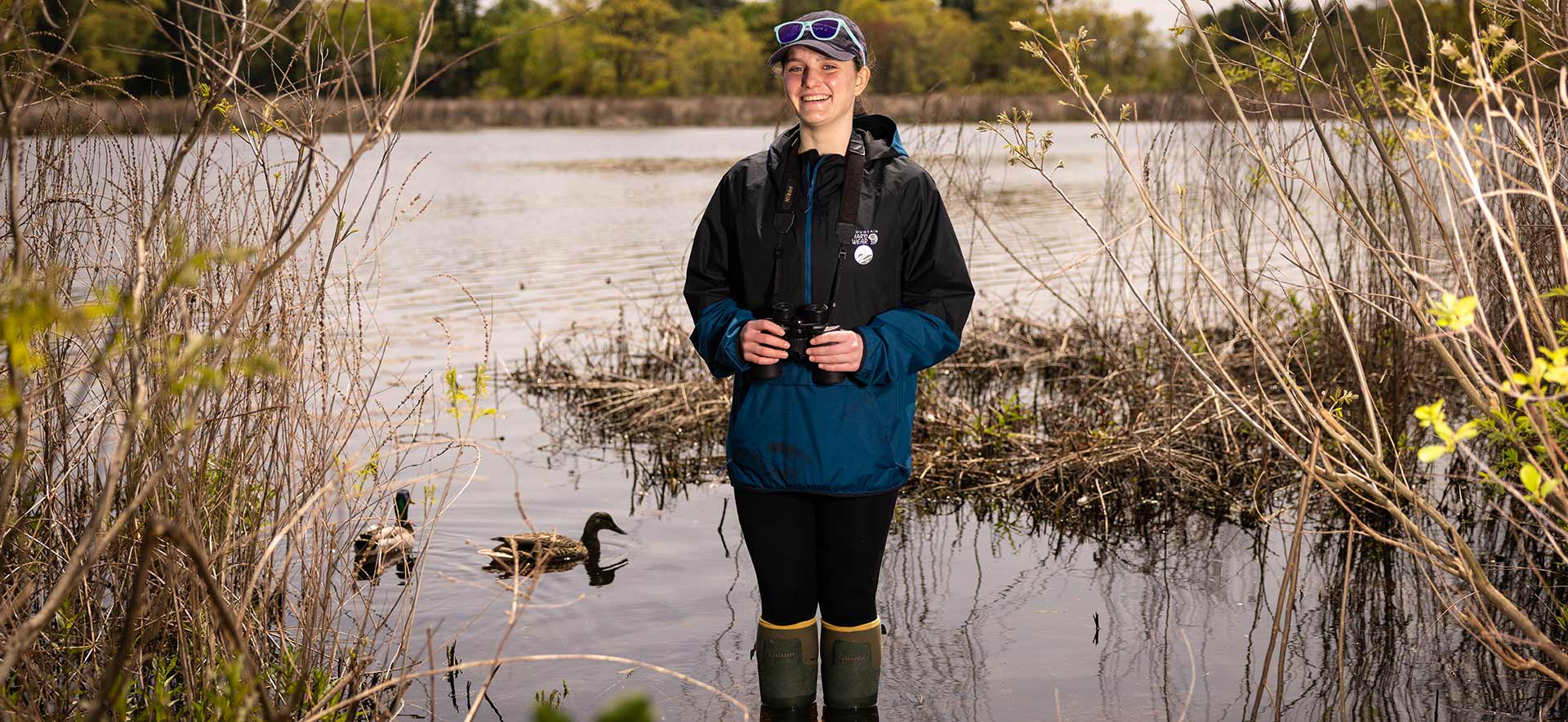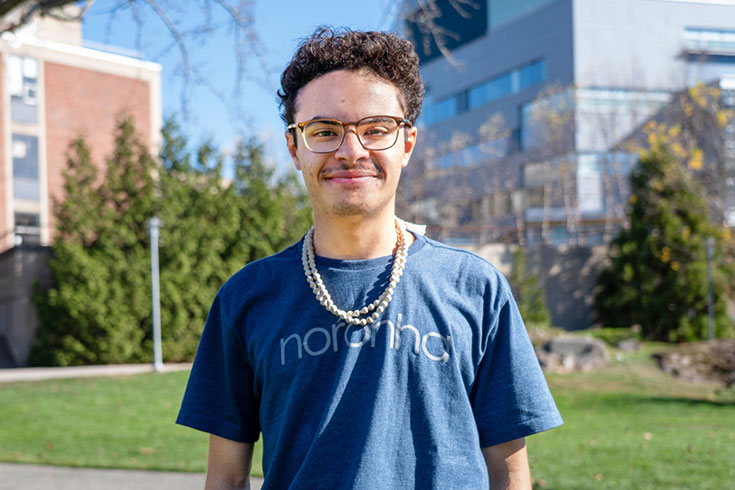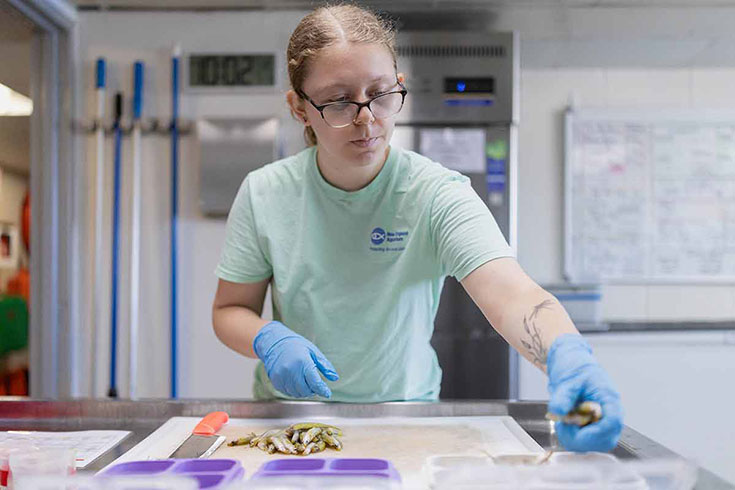Bachelor of Arts in Environmental Studies
Climate change. Natural-resource depletion. Biodiversity loss. Pollution. Pandemics. Toxic exposure. These are major threats to our world, and tackling them demands that we draw on a wide range of skills and knowledge.
The environmental studies program at Brandeis provides the breadth and hands-on learning to better understand such problems. Truly interdisciplinary, the program will expose you to both the natural and social sciences, including ecology, physical sciences, economics, history, and policy.
Why Brandeis?
We firmly believe in the value of experiential and service learning. There are ample opportunities to engage with the community at multiple scales, "get your hands dirty" (often literally), and make a real difference in people's lives.
Ultimately, environmental issues are social issues, and our program is deeply rooted in concerns of environmental justice. In this way it is well-aligned with the university's commitment to social justice. You will graduate equipped to understand and address today's most vexing and pressing problems.
Academics and Research
Expand All
- Environmental Studies Major (BA)
- Environmental Studies Minor
- Climate Justice, Science, and Policy Minor
Our program provides concrete preparation for addressing environmental and social justice issues through experiential learning courses, community and citizen science opportunities and internships. Our students delve into the policy, social impacts, and science of pressing environmental issues such as climate change, shifting distributions in biodiversity, changing ecological communities, toxic exposure, access to safe housing, healthful food, and open space.
Students also have the opportunity to gain research experience by working alongside their professors in the social and natural sciences. For example, students interested in environmental health topics have been involved in projects surveying local hair and nail salons for chemical exposure risk to salon employees, the results of which were shared with the Boston Public Health Commission and published in scientific literature. Students with interests in ecological management have worked with nearby towns in establishing forest studies and wildflower inventories to support adaptive management practices (see our Community and Citizen Science webpage).
Each year, the Environmental Studies Program selects students to award who have shown a commitment to academic excellence and community engagement. These are the current program awards.
Rachel Carson Award for Environmental Citizenship
The Rachel Carson award is provided to a senior student who demonstrates environmental citizenship in the local community. The award is named in honor of Rachel Carson, the marine biologist and nature writer who sparked the global environmental movement in 1962 with her book Silent Spring.
Attila Klein Environmental Conservation Award
The Attila Klein award goes to a senior student who has demonstrated outstanding conservation work. Attila Klein was a biology professor who worked for years to establish the Environmental Studies program at Brandeis, and was a great mentor to students and faculty.
Jacob B. Goldston Family Award for Environmental Excellence and Activism
This award is provided to a senior or junior student who has demonstrated outstanding commitment to the preservation and enhancement of the natural environment.
Laura Goldin Environmental Health and Justice Award
This award is provided to a senior who has demonstrated outstanding commitment to environmental health, justice, and sustainability work in the spirit of Laura Goldin.
Beyond the Classroom
Expand All
The environmental studies program maintains relationships with many local and national organizations that provide students with rich opportunities to experience environmental topics in government, industry, public-interest organizations, and scientific research institutions. Participating organizations include the Boston Harbor Islands (National Park Service), Charles River Watershed Association, Mass Audubon, and the New England Aquarium.
In addition, students have the opportunity to volunteer at the WATCH Housing Advocacy Clinic, which assists clients with fair and safe housing issues, particularly in addressing lead, asbestos, and other environmental exposure risks present in low-income housing and preventing evictions and homelessness.
See and learn how countries around the world — from Iceland and Greece to Costa Rica and New Zealand — think about and confront environmental issues. Studying abroad is enthusiastically supported by the faculty in environmental studies as a way to broaden perspectives on environmental issues and provide understanding in an ecological context.
As an environmental studies student, you'll have a variety of ways to become active outside the classroom, both on the campus and beyond it. The environmental studies program collaborates with Sustainable Brandeis, and numerous opportunities exist to help support campus initiatives. Student clubs include the Students for Environmental Action, Brandeis Community Farm and Brandeis Climate Justice.
Faculty Excellence
Expand All
Our faculty are not only dedicated teachers, they are active researchers and practitioners with expertise in environmental history, conservation biology, sustainable farming and forestry, and environmental health and justice.
Careers, Graduate Study, and Alumni
Expand All
Brandeis environmental studies graduates go on to a wide range of environmental careers in fields such as:
- Government, including the U.S. government, foreign governments, and state and local governments. Positions have included environmental aide for a U.S. senator; climate change coordinator for the British Virgin Islands; foreign service officer for the U.S. government; and Peace Corps volunteers in Senegal and Madagascar, to name just a few.
- Nongovernmental environmental organizations, including U.S. and international organizations in fields such as climate change, deforestation, energy efficiency, and environmental law.
- Ecology and conservation biology, engaging in fieldwork in the U.S. and abroad, studying forest ecology, as well as the behavior and conservation of birds, whales, and sea turtles.
- Environmental education, in high schools, museums, field stations, and farms.
Many of our graduates go on to master's programs in environmental science, water policy, sustainability, forestry, environmental education, public policy, and landscape architecture. Others have earned PhDs in environmental policy, ecology, conservation biology, forestry, geography, and environmental history. In addition, many of our graduates have embarked on studies in environmental law, medicine, or veterinary science.
It is very typical for our graduates to work for a few years after they finish at Brandeis before going on to further studies. During this time, they explore different environmental fields, which helps them decide on the work they hope to do and the skills they need to learn. After this period, a high proportion go on to graduate school; in fact, many environmental graduate schools strongly recommend that applicants have work experience before they undertake their graduate studies.


